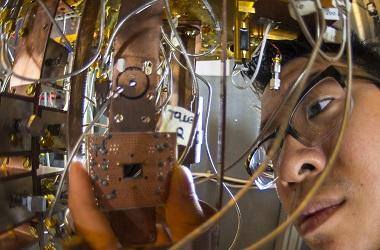IBM Sets Quantum Computing Milestone
The company sees the future of quantum computing as having a major impact in the life sciences and chemistry fields.


Hubble Telescope: 25 Years Of Stunning Images
Hubble Telescope: 25 Years Of Stunning Images (Click image for larger view and slideshow.)
Technology giant IBM announced two major breakthroughs towards the building of a practical quantum computer, the next evolution in computing that will be required as Moore’s Law runs out of steam.
Described in the April 29 issue of the journal Nature Communications, the breakthroughs include the ability to detect and measure both kinds of quantum errors simultaneously and a new kind of circuit design, which the company claims is "the only physical architecture that could successfully scale to larger dimensions."
The two innovations are interrelated: The quantum bit circuit, based on a square lattice of four superconducting "qubits" -- short for quantum bits -- on a chip roughly one-quarter-inch square, enables both types of quantum errors to be detected at the same time.
The IBM project, which was funded in part by the Intelligence Advanced Research Projects Activity (IARPA) Multi-Qubit Coherent Operations program, opts for a square-shaped design as opposed to a linear array, which IBM said prevents the detection of both kinds of quantum errors simultaneously.
Jerry M. Chow, manager of the Experimental Quantum Computing group at IBM’s T.J. Watson Research Center, and the primary investigator on the IARPA-sponsored Multi-Qubit Coherent Operations project, told InformationWeek that one area they are excited about is the potential for quantum computers to simulate systems in nature.
"In physics and chemistry, quantum computing will allow us to design new materials and drug compounds without the expensive trial-and-error experiments in the lab, dramatically speeding up the rate and pace of innovation," Chow said. "For instance, the effectiveness of drugs is governed by the precise nature of the chemical bonds in the molecules constituting the drug."
He noted the computational chemistry required for many of these problems is out of the reach of classical computers, and this is one example of where quantum computers may be capable of solving such problems leading to better drug design.
[Tech Buying: 6 Reasons Why IT Still Matters]
The qubits, IBM said, could be designed and manufactured using standard silicon fabrication techniques, once a handful of superconducting qubits can be manufactured quickly and reliably, and boast low error-rates.
"Quantum information is very fragile, requiring the quantum elements to be cooled to near absolute zero temperature and shielded from its environment to minimize errors," Chow explained. "A quantum bit, the component that carries information in a quantum system, can be susceptible to two types of errors -- bit-flip and phase-flip. It either error occurs, the information is destroyed and it cannot carry out the operation."
He said it is important to detect and measure both types of errors in order to know what errors are present and how to address them, noting no one has been able to do this before in a scalable architecture.
"We are at the stage of figuring out the building blocks of quantum computers -- a new paradigm of computing completely different than how computers are built today," Wong said. "In the arc of quantum computing progress, we are at the moment of time similar to when scientists were building the first transistor. If built, quantum computers have the potential to unlock new applications for scientific discovery and data analysis and will be more powerful than any supercomputer today."
Interop Las Vegas, taking place April 27-May 1 at Mandalay Bay Resort, is the leading independent technology conference and expo series dedicated to providing technology professionals the unbiased information they need to thrive as new technologies transform the enterprise. IT Pros come to Interop to see the future of technology, the outlook for IT, and the possibilities of what it means to be in IT.
About the Author(s)
You May Also Like
How to Amplify DevOps with DevSecOps
May 22, 2024Generative AI: Use Cases and Risks in 2024
May 29, 2024Smart Service Management
June 4, 2024







